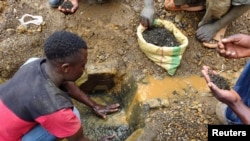The eastern Democratic Republic of Congo is renowned for its mineral wealth, but much of that wealth is untapped, partly because of fears that mineral exports have been funding conflict and that miners are exploited.
But a new initiative supported by the U.S. Agency for International Development is trying to reassure buyers that they can buy clean minerals from the area and that it's worth investing in eastern Congo's miners.
The mining industry in the eastern part of the D.R.C. has come a long way since 2010, when an international outcry over conflict minerals led to legislation in the United States.
Under the Dodd Frank Act, U.S. companies must inspect their supply chains for tin, tantalum and tungsten and inform regulators if they use metals from D.R.C. or neighboring countries. Initially, the legislation scared buyers away from the Great Lakes region.
Some have come back since a tin industry scheme called ITSCI started tagging, or labeling, bags from reliable sources in the region as conflict-free. But this year, tin exports from the region were still only half their 2009 level, and eastern Congo has been hit particularly hard.
This week a firm in the mineral-tracking business, the Better Sourcing Program, visited mining sites at Kalungu, near Goma. BSP is a subcontractor working with USAID to better track minerals.
Two miners showed the firm’s managing director, Benjamin Clair, a quantity of black sludge in a saucepan — coltan, or tantalum ore. He asked how much was there. The miners said it was about a kilogram, worth about $30.
“So the two of them made $30 in a day. That’s not bad, is it?” asked Clair. “Why aren’t more people working here?”
“It’s because they don’t have regular buyers,” a local cooperative member said.
“If we lack work, it’s because we don’t have tags,” said the cooperative chairman, Benjamin Mugaliya. “It’s the tags that cause the poverty here.”
Critics of the ITSCI tagging scheme complain that it works with only one cooperative in North Kivu province and has not much expanded the number of smelting companies buying minerals from Congo.
Clair believes conflict is no longer a major issue at the great majority of eastern Congo’s mining sites for tin, tantalum and tungsten, and that other issues such as child labor should be addressed but need to be seen in context. It's better, for instance, to have a teenager working at mining than committing crimes, he suggested.
BSP is piloting a new traceability scheme that will use smart tags, for exclusive use by exporters who invest in artisanal mining.
ITSCI said it was disappointed it did not get funding from USAID to expand its program. USAID's acting director in Congo told VOA the agency did not receive enough assurances from ITSCI about improvements in the scheme's transparency and information sharing, and eliminating conflicts of interest.
He added that having more than one traceability system would introduce competition and help deal with those problems.




